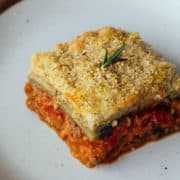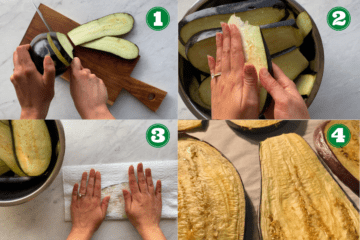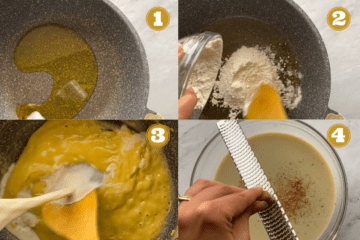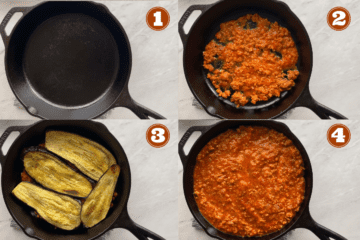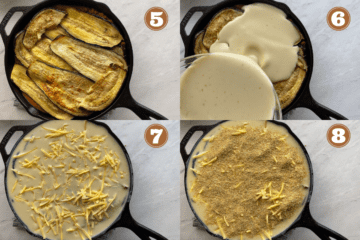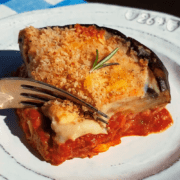Description
This vegan moussaka is as close to the original as it gets with a classic nutmeg béchamel, cinnamony ragu, and perfectly baked slices of eggplant. Can be made gluten-free and allergen-friendly with substitutions.
Ingredients
Eggplant:
- 2 large eggplants (~1kg / 2lb)
- 1 tsp salt (See Note 1)
- 2 tbsp olive oil
Vegan Ragu Filling:
- 1 tbsp olive oil
- 1 large onion, diced
- 5 garlic cloves, minced
- 2 tbsp tomato paste
- 400g vegan ground beef (homemade or store-bought, See Note 2)
- 1/2 cup red wine (or substitute with hot water)
- 1 cup hot water
- 1 tsp vegetable bouillon
- 400g tomatoes (fresh vine-ripened or canned San Marzano)
- 1.5 tsp sugar
- 2 tsp dried oregano
- 3 bay leaves
- 2 sticks of cinnamon (or 1/2 tsp ground)
- 1/2 tsp salt
Vegan Béchamel:
- 6tbsp (80g) olive oil
- 6tbsp (50g) flour
- 2.5 cups plant milk (unsweetened, unflavored)
- 1/2 tsp nutmeg, grated
- 1/4 tsp garlic powder
- 1 tsp salt
- pinch of white pepper
- 1 tsp potato starch (See Note 3)
Topping:
- 1/3 cup breadcrumbs (See Note 4)
- 2 tbsp olive oil
- Optional: 1/2 cup vegan mozzarella shreds
Instructions
Prepare the eggplants:
- Preheat oven to 425°F.
- Slice the eggplants lengthwise (quarter-inch slices). Salt all sides and place in a colander to sweat for 30 minutes.
- Thoroughly dry the eggplant slices with cloth napkins or paper towels.
- Place on baking trays lined with parchment paper or silicone sheets and brush both sides with olive oil.
- Bake for 20 minutes until golden brown and set aside.
Make Vegan Ragu:
- Heat olive oil in a large pot over medium heat. Add and sweat the onion for 4 minutes. Add the garlic and tomato paste and cook for 2 minutes.
- Add the vegan ground beef, break it up, and cook for 5 minutes.
- Add wine and cook off the alcohol for 2 minutes.
- Mix and dissolve the vegetable bouillon in the hot water in a separate bowl and add into the pot.
- Add the tomatoes, sugar, dried oregano, and salt; then mix.
- Add the bay leaves and cinnamon sticks. Let simmer on medium heat for 20 minutes, until reduced to a very thick ragu. Remove bay leaves and cinnamon sticks before using.
Vegan Béchamel Sauce:
- In a large saucepan over medium heat, add the olive oil and warm for 30 seconds.
- Add the flour and whisk to form a paste. Cook, stirring constantly, for about 1-2 minutes, until the scent of raw flour is gone.
- Add plant milk gradually, a few tablespoons at a time, and continuously whisk, getting all corners and bottom of the pan. See FAQs in the post in case the béchamel sauce gets clumpy.
- Cook on medium-high heat, stirring, until sauce begins simmering. Reduce heat to low and cook, stirring, until the sauce is thick enough to cover the back of a wooden spoon—about 5 minutes.
- Stir in the grated nutmeg, garlic powder, salt, white pepper, and potato starch. If not using right away to top the moussaka, press a piece of plastic wrap over surface of sauce to prevent a skin from forming.
Assemble & Bake:
- Lower the oven to 350°F.
- Place a little bit of the vegan ragu (less than 1/5th) at the bottom of a baking dish (80-sq-in minimum, see notes). Place half the eggplant slices in one layer, then top with the remaining ragu.
- Place the remaining eggplant and pour over the bechamel.
- Sprinkle with breadcrumbs, drizzle with olive oil, and top with vegan mozzarella shreds.
- Bake for 40-50 minutes. If the top isn’t golden brown by this point, broil the top for 5 minutes. Let the moussaka rest for at least 15 minutes before slicing and serving.
Storage:
- Place in an airtight container and keep in the refrigerator for up to 4 days or in the freezer for up to 3 months. Reheat in a covered skillet on the stovetop on low-medium heat or the microwave.
Notes
1. Eggplants: Salting and drying the eggplants prevents a soggy moussaka. This way the only liquid at the bottom is the flavorful ragu. But if you find the process too labor-intensive, simply salt the slices with quarter the amount and bake them right away. Additionally, contrary to popular belief, nowadays salt isn’t necessary for taking out the bitterness of eggplants. Luckily, that bitter taste has been bred out of the modern eggplant.
2. Vegan Ground Beef: The homemade mushroom-walnut mince works great in this recipe. Impossible or Beyond ground beef, as well as any other soy mince would work as well. Don't want to bother with "beef" at all? Use cooked green or brown lentils instead for a more whole-food-plant-based approach!
3. Starch in Bechamel: Moussaka béchamel is quite different than the runny white sauce you may be familiar with. This Greek type of béchamel used in moussaka often has eggs for structure. For a vegan version, in addition to using more flour (~3 tablespoons per cup of milk), incorporating a starch ensures the final dish isn’t runny. You may substitute potato starch with 1.5 times the roux or double the amount of cornstarch if needed.
4. Breadcrumbs: Although not traditional, you may substitute the breadcrumbs with Panko.
5. Turkish Moussaka: If you’d like to simplify the dish, skip the béchamel to make the Turkish version of moussaka!
6. Baking Dish Size: The dimensions are very important for this dish—otherwise you may have leftover ingredients or the moussaka may not have enough height. 10-in-diameter skillet or a 10-in by 8-in tray both work. Make sure the total area of the dish is at least 80 square inches with a minimum 2-in lip.
7. Salt Type: This recipe lists table salt. You may substitute with Kosher salt by using double the volume (same weight).
8. Whole-food-plant-based: You may completely remove the salt and oil from the eggplants as well as the ragu. For the béchamel, make a cashew cream flavored with nutmeg.
9. Scale: Vegan moussaka is perfect for scaling up and saving in the freezer for busy weeknights! Just make sure to divide up the ingredients for each layer according to the baking dishes you'll be using.
- Prep Time: 1 hour
- Cook Time: 2 hours
- Category: Lunch, Dinner
- Method: Bake
- Cuisine: Greek
